1962 was the year when Mohammed Khaliq Choudhary came to Blackburn. For a short time, Mohammed worked in a small factory in Blackburn.
In the 60s and 70s Blackburn and Bradford were much more comparable than London according to Mohammed Khaliq Choudhary.
"They both had a local community feel and a diverse population. This meant that facilities with both offered halal food, masjid, shopping etc. so were good places to settle in".
He states how London was very different. It was always really busy, more expensive and didn't have much of a local community feel.
"Though I had contacts, people were based all over London and therefore networks of support were sometimes further away. Remember, this was way before mobile phones and so close contacts and networks were a great help".
Mohammed Khaliq Choudhary explains how London had good transport links, better job opportunities, and nice to see as it is the capital city. However, he found the place was far too busy for him.
When speaking about moving to Blackburn he says, "The town was ok; it was like all other northern towns. I did have some contacts already in the town which was good, and the people were generally quite friendly too."
Mohammed lived on New Park Street, which was very close to the town centre, part of this street still remains today but some of it was demolished and that is where we now have a dual carriageway, known as Barbara Castle Way.
"I bought my first house in 1962, it was on New Park Street. It was a three-bedroom house. The house was bought jointly by a group of us for a grand total of £925. In 1964 I went to Pakistan to visit family and I sold my share of this house. On my return I bought another property on Warwick Street, this was eventually demolished in 1979 to make way for 'Waves' swimming baths. I then bought property on Norwich Street."
Communicating was not an issue for Mohammed Khaliq Choudhary as he had learnt how to speak, read and write English whilst he was in Pakistan.
"English wasn't a challenge for me. I could also speak Punjabi and Urdu. Being able to read and write meant that people who were not very literate would often ask me for support, and I suppose that is how I got involved in community work.
"My main purpose for coming to the UK was to work. I already completed my education in Pakistan so that wasn't something I was looking to do once I got here. Working life was rewarding but difficult due to the long hours. It was different to my time working in Pakistan and took time getting used to."
After a brief period working in the textile industry, he began working on the buses as a conductor.
"I preferred working as a conductor opposed to working in mills and factories."
Mohammed Khaliq didn't buy a car for many years after arriving to the UK.
"I used to get around on public transport, there was generally a good service, and it was economical to travel by public transport."
"I bought my first house in 1962.
It was a three-bedroom house.
It was bought jointly by a group
of us for a grand total of £925!"
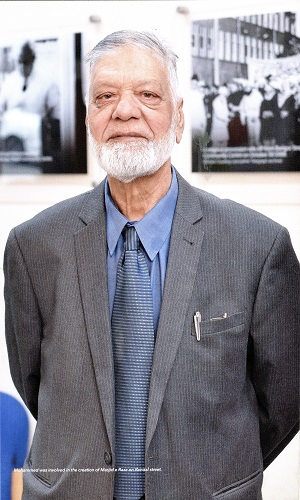
Mohammed was involved in the creation of Masjid e Raza on Randal Street
At his first job after moving to the UK Mohammed Khaliq was paid around £11 a week. As years passed and his roles changed this did eventually increase to a few hundred pounds a week.
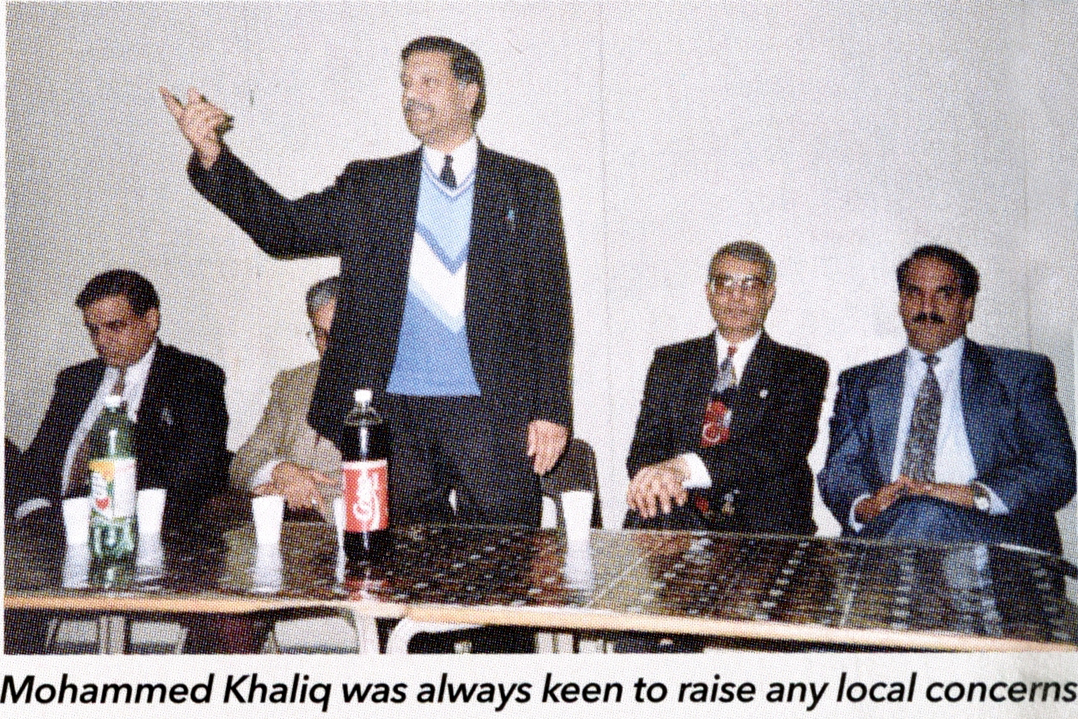
"I would usually split my income in two; half for myself and my family in the UK and the rest I would send to my family in Pakistan."
Mohammed states how we are now very lucky to have shops where halal meat and food is readily available. When he first arrived in the UK and specifically Blackburn there weren't any shops where you could go into and pick up whatever you wanted.
"In the beginning we made links with some local farms, where we could buy meat and arrange slaughter. Later on, in the 1960s, a halal meat shop was set up in Preston, so we were able to organise deliveries to Blackburn.
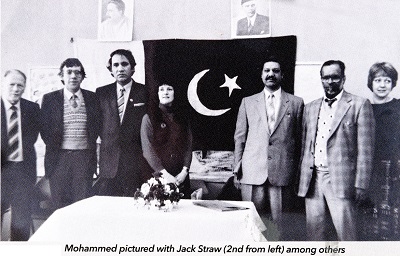 People would usually cook themselves at home opposed to getting food from takeaways and restaurants. Eating out was a rare occasion for most people who had come to the country to work. If we wanted to treat ourselves, we would usually get some fish and chips. There was not much in the option of halal restaurants and takeaways in those days.
People would usually cook themselves at home opposed to getting food from takeaways and restaurants. Eating out was a rare occasion for most people who had come to the country to work. If we wanted to treat ourselves, we would usually get some fish and chips. There was not much in the option of halal restaurants and takeaways in those days.
When we first came to the UK, we didn't have a lot of free time due to work commitments. When I had some time off, I would socialise with friends and family, organise get togethers, visit social venues and of course shopping."
Being able to practice your religion is very easy with mosques and religious centres in every area. This wasn't the case when Mohammed Khaliq first moved to Blackburn.
"There was no mosque initially, prayers would be performed at home, venues would have to be booked for prayers like Eid namaz."
Mohammed recalls mosques started to be established in the 60s and 70s. Millham Street and Bicknell Street were the locations of the first mosques in Blackburn.
"I was involved with Randal Street, Masjid e Raza since its creation in the early 1970s and still remain a part of it today."
The community would get together and dig deep to purchase the early mosques in Blackburn as money was tight and many people had financial responsibilities abroad as well as here in the UK. However, though facilities were basic, the mosque would be a place where people came together.
"When I first came to Blackburn in July 1961 I didn't initially register to vote because we didn't know we needed to. Barbara Castle, who was the MP of Blackburn, came canavssing one day and introduced herself and her role. She introduced me to political activity. There was a number of challenges in them days including frequent attacks from the far-right so I became involved in local politics as an activist."
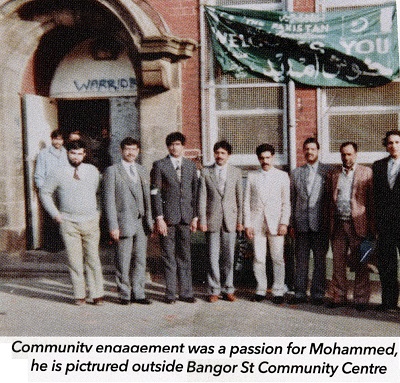 Mohammed Khaliq has been involved in supporting local democracy since the 1960s. In 1992 he stood as a local councillor. He remained a councillor for 12 years. Community members were his main drive as they would constantly ask him to stand for the elections.
Mohammed Khaliq has been involved in supporting local democracy since the 1960s. In 1992 he stood as a local councillor. He remained a councillor for 12 years. Community members were his main drive as they would constantly ask him to stand for the elections.
He was also involved in various civic roles, community and voluntary roles.
"I sat on an appeal tribunal for several years since the 1980s, I also was involved in setting up the Pakistan Welfare Association as well as supporting other community and faith organisations like the Lancashire Council of Mosques. I also served the community as a local councillor for the Bastwell ward for several terms."
When talking about how Blackburn has evolved, Mohammed states how the town has changed for the better
"Blackburn is a lot better now. In the 1960s the town centre was small, with no large stores. The bus station has improved massively, we now have a mall and market where previously there was a three-day market and an open market."
Mohammed Khaliq Choudhary has witnessed the many stages of the town and mentions the positive development in terms of infrastructure, housing and education.
"Overall, though things may not be perfect here, I feel there is more choice, variety and I feel we have a great diverse community."
Mohammed Khaliq Choudhary died on the 11th February 2025.
Transcribed by Shazia Kasim from;
OneVoice Blackburn, Issue 9, Summer 2024, page 13
With grateful thanks to the team at OnceVoice Blackburn for allowing Cotton Town to publish this article.
Published on Cotton Town, August 2024
Please select the following link to find out more about One Voice Blackburn
back to top
From Nairobi Colony to 50 years in Holland Street
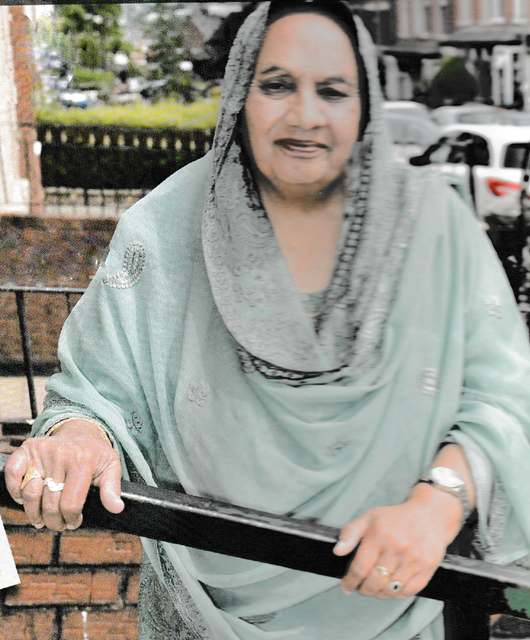
"It was winter when I arrived, so I was
forced to wear a coat, gloves and scarfs,
something which was not me."
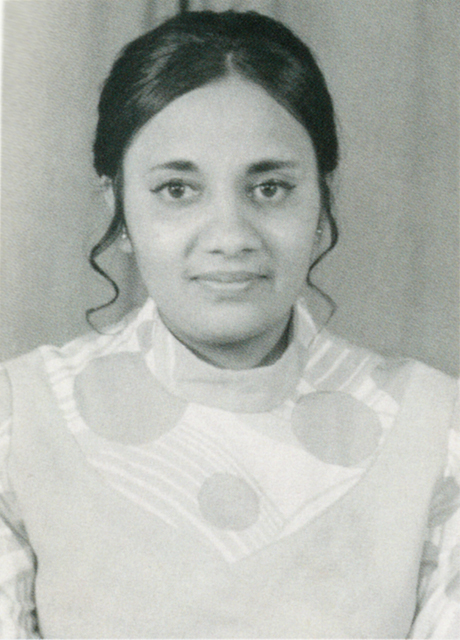 Aisha Jaffer was born in Nairobi in Kenya in January 1950. Her parents arrived in Africa from India in the 1930s for work. Her dad opened his own business, and they lived in a colony area. She came to Blackburn in the early 1970s. She has been interviewed by Ammarah Ikram, aged 13.
Aisha Jaffer was born in Nairobi in Kenya in January 1950. Her parents arrived in Africa from India in the 1930s for work. Her dad opened his own business, and they lived in a colony area. She came to Blackburn in the early 1970s. She has been interviewed by Ammarah Ikram, aged 13.
"I was born a British African, as at the time of my birth Kenya was a British colony meaning Britain still had full control - so I was British born" says Aisha.
"I had a very jocular childhood, it was amazing. I am one of seven children. There is a 10-year gap between myself and my eldest sister. I am the second born. I was quite bright as a child and loved talking and making people smile. I was high spirited and exuberant. I would like to think I am still the same now."
Even though Aisha's plot area included people mainly from India hers was the only Muslim family, there were eight other families.
"There were over 40 children in our area, and we used to get together on one another's special occasions. Even though we were from different religions we were like a family. We all visited mosques, churches, temples, gurdwaras. We were never discouraged to play with each other, it was very multicultural and educational. There was a lot of unity within the community, doors weren't locked, and the neighbours would pop in with homemade delicacies to share. At the time in my generation, you'd normally not have such familiarity and multiculturalism."
Aisha still speaks lots of languages which she learnt in her youth including Gujrati, Kutchi (her mother tongue language), Punjabi, Hindi, Urdu, Swahili, Kikuyu and Kamba.
Aisha also started mosque when she was two years old, and completed the recitation of the Quran by the age of seven.
"Teaching was regarded very highly for parents, and they wanted children to achieve well, and we learnt about everyone's religion and culture."
Kenya was a British Colony and run by the British until 1963 when Kenya gained independence. Under Kenyan rule life became difficult for 'British' citizens especially at work.
"I was working in Kenya as a nursery nurse. It became perilous living there and so being a young girl my parents sent me away.
"It was also becoming more expensive for us. We couldn't go out alone as young women, so it was decided I move to the UK as I already had a sister and brother in Blackburn."
"You can't get a parking
space outside your own
house now unless you live
in a house with a drive,
whereas in the 1970s this
was never a problem."
Aisha was 23 when she arrived in the UK on 20th December, 1974. 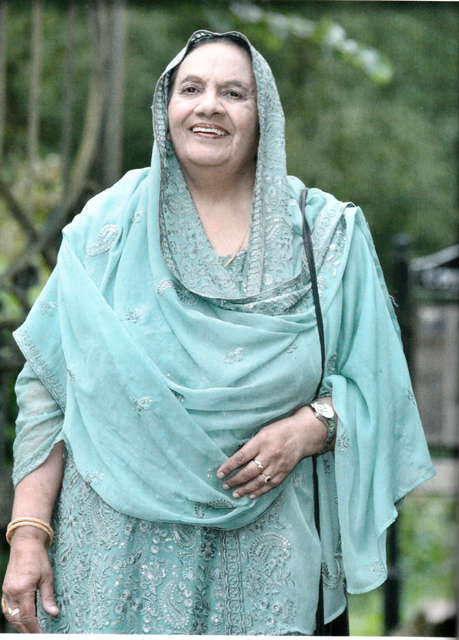
"I landed at Heathrow Airport and was welcomed by two feet of snow!
"My brother, sister and cousin came to pick me up. There was heavy snowfall, and I was loving it because it was something I had only read about and never experienced.
"I came to my sister's house on London Road, in Blackburn, and stayed there. I was extremely tired. I had uncles and aunts living in Blackburn who were being nice and caring towards me. At the time I was happy and felt good that all these people have come to see me, but after that one day no one came to see me, no one had any time."
Aisha's initial reaction to Blackburn and the UK changed very quickly.
"I did not like it here. It was very isolated, not many people around, no friendships and it was very cold, dark and gloomy. It was winter when I arrived, so I was forced to wear a coat, gloves and scarfs, something which was not me. I didn't wear these items at all in Kenya. It was very dark and not lively at all. Kenya, and the whole of Africa, was a very lively place."
Due to her experience and British based qualifications Aisha was able to secure a job at St. Anne's Nursery in Blackburn.
"Even though I had a job and was going out I found Blackburn people were too busy working and there was no time for people to interact. We rarely had visitors, and I was very lonely, just four walls to look at away from work. I found it to be disconnected, lonely, bored and very depressing. It took me two years to settle properly".
Aisha settled in Blackburn due to her brother and sister being close by. She has been in the town ever since.
"The best thing about Blackburn was that everything was within walking distance. I stayed with my sister on London Road for 18 months and then I bought my own house on Holland Street with my brothers help and I have lived in the same house. I bought it for around £4,000. I still have the same phone number."
Life was very different in Blackburn in the early 1970s. The winters were very cold. Food wasn't as easily accessible according to Aisha.
"There were hardly any cars on the road. If you owned a car, you were seen as rich. There were no parking problems like we experience now. There were no takeaways that you could get food from like pizzas or burgers, so you had to cook at home.
"There were no halal meat shops like there are now. My brother bought our meat by going to the farm and slaughtering the animal himself. It was very expensive and extremely difficult to buy halal meat, nothing like today where you have so many choices and varieties.
"There were only a few schools around and they were mainly white with a few Asian children. There were just a few mosques in houses at the time."
Aisha tells of the difficulty facing south Asian women at the time. Men had come to Blackburn from the late 1950s. Women, including wives, started to arrive in the late 1960s.
"It was a difficult time for south Asian women. A lot of them seemed unhappy, they didn't go out, they didn't work, they stayed at home and didn't dress up or go out at all. They didn't speak English so there was a big language barrier. Women from a south Asian heritage were not allowed to work, it was as though they were meant to stay at home to cook, clean and look after the children. They had to rely on their husbands for everything and could only do things that the husband or family head agreed on."
Aisha accepts she was one of the lucky ones. She had started building up a career for herself, and she became well known among the health authorities.
"When I worked at St. Annes for eight years, I was paid approximately £25 a week. I gave £5 to my sister when I was living with her. I think got paid a good wage compared to others who worked in factories, however there was a pay difference between men and women.
"After the teaching job I was given the opportunity to apply for a job at the NHS as a Link Worker. The job was for a bilingual worker to work with south Asian women, a lot of these women were coming from abroad and a lot of babies were dying so the NHS wanted a bilingual translator as a patient advocate or link worker because I knew a lot of languages. A friend of mine, Christine, who used to live on Palmer Road, said it would help a lot if I applied for the job. So, we filled the application form, I secured an interview and got the job."
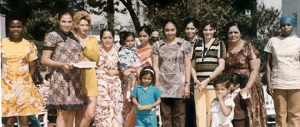 Aisha pictured in Nairobi in the early 1070's
Aisha pictured in Nairobi in the early 1070's
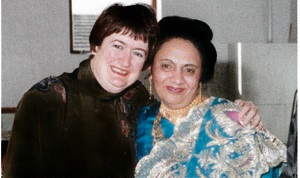
Aisha with good friend Christine
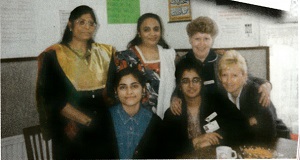
An Image from the 1980's with work colleagues
Although it was a demanding job for Aisha, it was also tremendously enjoyable.
"I supported lots of young girls who came from abroad. I dealt with many challenges such as sexual abuse, domestic violence and helped lots of girls who had babies at a very young age.
"Domestic violence remained largely unrecognised but sadly that did occur at the time, and sadly still does. But at that time there was no real support for women.
"Now, there are lots of places women can go for support and this makes me extremely happy. There are women groups helping and supporting women all over Blackburn and so many charities doing lots of good work, including One Voice, helping and supporting the people of Blackburn."
Aisha is rightly proud of the fact that she was self-sufficient, she did not need to rely on a husband (she married later in life) and tried to make a real difference to people's lives.
"When I bought this house, it was immaculate. The previous owner spent a lot of time and effort building this house as he was an architect. My parents came from Kenya and stayed with me, and only then did I feel better in the UK and started having a home life."
Aisha has always been a talkative person, and when interviewing her I realised that to be the case. She can make friends with anyone.
"I made lots of friends through the work I did, and I had a lot of support from my husband, even though I got married later in life. We were best friends, and he was my rock. Sadly, he passed away three years ago and I miss him every day. I have lots of very happy memories with him and the life we spent together."
The 74-year-old recognises that Blackburn has changed. She prefers it in many ways. Despite a few teething issues she is proud that she has never wanted to move anywhere else.
"I bought my own house on Holland
Street... for around £4,000 (In 1976).
I still have the same number."
"Blackburn has become more like a city now; you can buy anything. You don't need to go to Pakistan or India to buy things, you can buy anything, and it doesn't cost a lot. It's got beautiful parks, the markets have changed, there is a new bus station, there are a lot more south Asians living in Blackburn. There are lots of schools and mosques in Blackburn. There are choices and variety of different takeaways and restaurants, which is amazing. I think there must be over 200 takeaways in Blackburn.
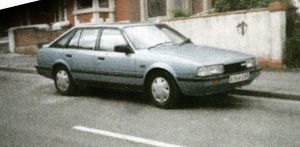
A car was a Luxury some 40 years ago
"You can't get a parking space outside your own house now unless you live in a house with a drive, whereas in the 1970s this was never a problem. But overall Blackburn has become a better place because despite everything people are interacting more. Like I said when I first came it was very lonely. It isn't now."
Aisha has a message for young people which revolves around education, ambition and religion.
"Do well in life. Make sure you have a good education behind you. Get a degree - this is important as it will give you more options.
"You are all very lucky as there are so many opportunities available now so you should use them and aim high.
"I wanted to become a doctor, but my father didn't allow me to, but the children today have lots of opportunities and support so please use them and complete your studies and make your families proud.
"Girls and women have better opportunities now. You can get any job you want, women can travel anywhere in the world, they have become more independent, they can drive. I feel they are stronger and confident now as they are working and still taking care of the children, parents and looking after the home. I really applaud that.
But don't forget your religions and your prayers. Without them you are nothing".
Transcribed by Shazia Kasim from:
OneVoice Blackburn, issue 10, Autumn 2024, pages 13-16.
With grateful thanks to the team at OnceVoice Blackburn for allowing Cotton Town to publish this article
Published November 2024
A Leader of Our Times
From Rawalpindi to Pennsylvania and back to Blackburn
Mohammed Khan was one of the most celebrated politicians of his time in Blackburn with Darwen. But he was also among the early arrivals of economic migrants in the early 1960s. Sundas Bakhat speaks to the now retired Mohammed about Pakistan, Blackburn and Pennsylvania.
Mohammed Khan was born in Rawalpindi, in Pakistan, which is about 32 miles away from the country's capital Islamabad. His family lived in a village called Bhalla, Tehsil Kallar Syedan.
"One of my earliest memories is of playing football and cricket in my childhood. My friends would also play kabaddi. I won a district award in long jump once as I really enjoyed that."
Mohammed Khan still has a lot of friends and connections in Pakistan and meets them whenever he travels to the place of his birth.
"There are not a lot of them around anymore as most of them have sadly passed away. It is sad but that is life.
"I came from a family of three brothers and two sisters including myself. My sisters are older than me and still live in Pakistan, they are both over 90. I had an older brother who has passed away and a younger brother who lives in the UK."
Mohammed Khan went to primary school in Kallar Syedin and studied at a college in Rawalpindi for two years. He planned to go into the Pakistan Air Force for which he passed the initial exams, however he was sent a work permit from his brother who was already living in Blackburn.
He came to the UK in June 1964 where he worked in a textile mill. At the same time, he studied textiles and technology at Blackburn College.
"I was 19 years old when I came to the UK, so I was pretty young. It helped that my brother was already here. That made the transition a little easier. There were also people that were from the same area as me from Pakistan.
"I landed in Heathrow Airport. There were no mobile phones in them days and my brother didn't have a telephone in the house he was living in. The plane that I was travelling on was diverted from Islamabad to Karachi, so I stayed overnight in Karachi. That meant that my flight was delayed by one day.
"I sent a telegram to my brother to let him know. He didn't receive that telegram on time for some reason, so he wasn't there when I eventually landed.
"I didn't know what to do when I landed so I asked everyone and anyone on how to get to Blackburn. Being able to communicate and speak in English really helped me when I first moved to the UK. A lot of people weren't familiar with Blackburn but eventually I figured it out through mentioning Preston and Manchester - that was how I got to Blackburn."
Mohammed ended up getting a bus to Victoria Station and then got on a train to Blackburn, all by himself.
"It was a huge surprise for my brother when I knocked on the door and he saw me standing in front of a taxi. He thought I had got a taxi all the way from Heathrow to Blackburn, and you can imagine the look on his face. I assured him that I hadn't done that.
"The first thing that I noticed when I came to Blackburn was the weather. I came in June, so I thought it wasn't too bad at first, but when the winter hit it was terrible. I remember it always being dark because of the smoke from the mills and factories."
Mohammed Khan lived on 144 Addison Street, off Devonport Road, when he first moved to the town that he would call home.
"There were nine people living there. It was a three-bedroom house, but we all had a great time. We all shared duties and always ate together when could. There were no halal grocery shops in Blackburn so we would have to order things on a weekly basis from Preston."
Blackburn has seen a huge change over the years according to the 78-year-old.
"I remember it was May 1965 and it was snowing so much. You don't see much snow in the winter let alone in spring these days. The winters were very difficult. We didn't have cars, so we had to go on public transport everywhere we needed to go. Life was tough but we had to work through it. Young people will never understand how hard we worked to build a life for our families, here and abroad."
Mohammed Khan's first job was working in textiles as a weaver, after that he eventually became a supervisor. At the same time, he continued studying at Blackburn College.
When he passed his course in textiles and technology he was alerted to a job in the USA.
"I remember applying for a job in America that was advertised in The Guardian. I went for the interview at the Piccadilly Hotel in Manchester. I was successful and got the job as a technician. They sent me the ticket and all the other paperwork, so I did not need to worry about anything. I worked in America between 1973 and 1981, in Pennsylvania.
"Life was great in America. I had all the facilities I could need. The company that I worked for provided me with an apartment and company car. The neighbourhood was superb. However, my time in the USA ended as my family wanted me to move back to the UK so that I was closer to my brother. When I returned, I got straight into a job as a supervisor at Blackburn Coal Company before opening my own general food store."
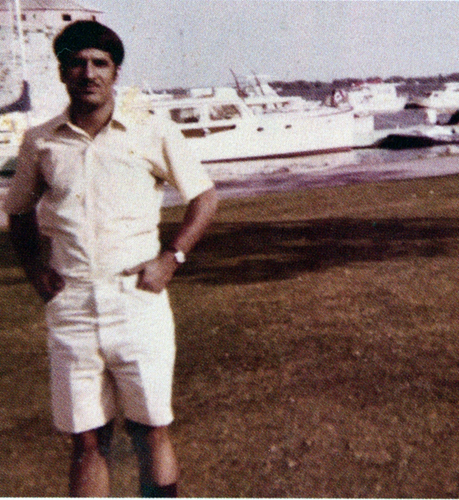
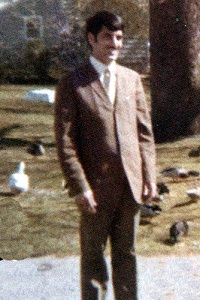
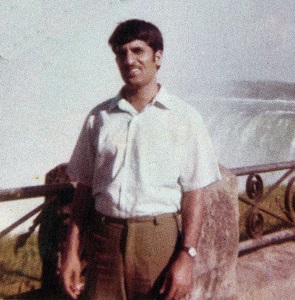
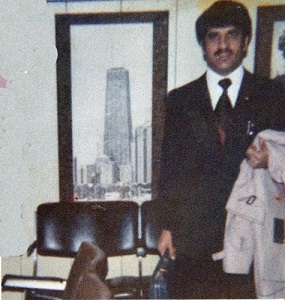
A Selection of Images of Mohammed's time in the US
"I landed in Heathrow Airport (May 1964). The plane that I was travelling on was diverted from Islamabad to Karachi, so I stayed overnight in Karachi. That meant my flight was delayed. I sent a telegram to let him know. He didn't receive that telegram on time for some reason, so he wasn't there when I landed. Eventually I figured it out through mentioning Preston and Manchester - that was how I got to Blackburn."
It wasn't soon after he opened his shop on Johnston Street that Mohammed Khan's political journey began.
"I was very interested in community work. I was part of the Pakistan Welfare Association (PWA), Ethnic Minority Development Association (EMDA) and the Racial Equality Council (REC). I was chair for 15 years. When people had any issues, they would come to me and ask whether I could get hold of councillors.
"Our MP back when I first arrived in Blackburn was Barbara Castle; she was a lovely lady. I would often go to see her to sort things out for people. One day she said, 'Mo, you are doing so much for the community why aren't you interested in politics'. I was adamant that I didn't want to get into that. She told me that she got into politics because she wanted to make a real difference to people's quality of life including education, housing and environment and that's why she did what she did. That's when I joined the Labour party."
Mohammed Khan eventually became a councillor in 1992. He was selected to join a variety of committees in the Council, including Housing. He represented Blackburn with Darwen Borough Council as Mayor in 2008. He has kept a close friendship with former Blackburn MP Jack Straw for over 40 years.
In 2007 he was awarded an OBE in the Queen's Birthday Honours. One of Mohammed's greatest successes in the council was delivering the housing project. That is where he got the opportunity to work with Tony Blair and David Milliband.
"I also met John Prescott through this scheme. The total length of the project was supposed to be 15 years. We ran it for six years before the Conservative government came in and put a stop to the funding."
When Kate Hollern became MP in 2015, several people suggested that Mohammed Khan should apply for the job as council leader.
"I was up against two other people; we went through a question-and-answer session in front of a panel. They had allocated an hour for each candidate and at the end of it they decided that I was the best fit for the role."
Mohammed Khan became leader and was immediately faced with a huge challenge because the government decided to cut the local budget by 20 percent and then eventually by 40 percent. That was equivalent to around £140 million.
"That was the point when I gathered everyone and went out and spoke to the people of our community to tell them about the situation and get their views on what services should be cut and what should be kept. It was a difficult time but we knew we had to make it work."
Mohammed Khan believes that the local Council and its leadership have done a very good job. He retired as Leader in 2022 with some landmark achievements.
"We won the Council of the year award twice. That's something to be proud of as there are over 400 councils that were in the running. The last time we won it, 2018, I was the Leader of the Council."
Mohammed Khan received his OBE from King Charles (then Prince Charles) in 2007 and 13 years later got his CBE from Prince William. In total he has visited Buckingham Palace five times.
People still refer to him as 'Councillor Khan'.
"The CEO of One Voice still calls me Councillor Khan and a lot of other people I meet while on my walks around Corporation Park do the same. I tell them that I am no longer a councillor, but they say to us you will always be Councillor Khan. Which is very nice.
"When I was in the council it was very difficult to travel abroad because you are always so busy. The most I could go away for was seven to ten days at a time. Most of my family, including my children, grandchildren, great grandchildren, nieces and nephews live in the UK so it's hard to leave all that behind and travel. But I really want to spend some time in Pakistan.
"Last year I visited Dubai and then went to Pakistan from there. I was lucky enough to see some of the beautiful landscapes of Northern Pakistan including Swar Valley and Hunza Valley. I also visited Kashmir which is equally as beautiful. Blackburn is my home, but Pakistan is where I am from."
Mohammed now largely spends his time visiting his family locally. But he can't resist the lifelong urge of helping and supporting people. Mohammed Khan was one of the very first people who supported the work of One Voice Blackburn.
"When talks around creating an organisation called One Voice Blackburn came about, a few people came around to talk about the initiative and asked whether I could help. I initially started laughing because I had been involved in many different organisations and found that people were looking for recognition for themselves as individuals and not for the greater community good.
"But they ended up explaining exactly what and why they wanted to do it, and I agreed to join the initiative. I was curious to see whether this would be any different."
When speaking to Mohammed Khan, his immense pride at the progress of the charity since its inception in 2011 was clear to see.
"One Voice are constantly creating new opportunities and coming up with unique ideas all the time. Especially with the magazine and all the events. They bring everyone in the community together. No one has been able to achieve what they have, and that includes the PWA, EMDA and REC. Their work has been inspirational when it comes to health, empowerment and cohesion. But there is still a lot to do, and I wish them every success.
"My work is done, but if anyone needs my help I will be there for them, always."
Transcribed by Shazia Kasim
Article published in One Voice Blackburn, issue 11, Winter 2024. Pages 13-16.
With grateful thanks to the team at One Voice Blackburn for allowing Cotton Town to publish this article
Published January 2025
back to top
From the Glorious 1960s to Modern Day BlackburnBlackburn couple reflect on nearly 60 years of life in the town
Ashok and Jai Chudasama are one of the most recognisable couples in Blackburn. Their community work stretches over 50 years, and his work on cohesion has been vital in a diverse town. Ashok takes us through their journey of bringing their entire family to Blackburn, settling down, their hard work and dedication in both family and work life.
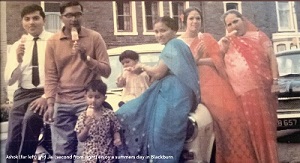
Ashok (far left) and Jai (second from right) enjoy a summer in Blackburn
Ashok was born in 1946. He came to the UK from Dar es Salaam, Tanzania, in 1964 and met his wife Jai who came to London from Nairobi, Kenya in 1968. They both derive from the Hindu faith. They met, got married in December 1968 and settled down in Blackburn. They have since stayed in the town that they now call home.
"I first came to the UK with some friends from Dar Islam in December 1964. There was a Gujrati Muslim family who moved to Blackburn because they knew some friends who had moved to Blackburn. I had never heard of the town, but I asked whether I could come stay with them. So initially they helped me settle in the UK.
"After a few months my parents joined me here in the UK. We lived on Peters Street in Blackburn before moving to Devonport Road."
Ashok started off working in the textile industry in various mills. He left his first job because the noise from the machinery was overbearing. He eventually moved to Mullards where he worked for 16 years from 1966-1982.
"My wife Jai moved to the UK in February 1968. My parents had some relatives in London who also knew Jay's oldest sister. My wife was living with her sister who had a flat in London at that time. My parents went to see Jai and that's how we met. We had a talk and from that decided to get married. We got married within three weeks. Back then weddings were very simple and fuss free."
"We would all participate in each other's festivals and happy moments. There was more cheer, and celebrations were a huge thing. I felt that people made more of an effort."
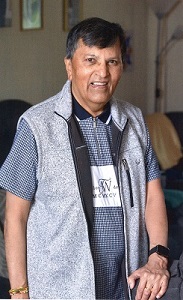 Ashok and Jai settled in Blackburn because Ashok's family were all living here.
Ashok and Jai settled in Blackburn because Ashok's family were all living here."We followed our culture greatly and it was the norm for the wife to move to where her husband and his family were. We lived on Edmundson Street".
Initially there were very few Hindu families living in Blackburn according to Ashok and Jai.
Jai was working in a school where she got close to a lot of Muslim parents. Although she retired in 2004, she reflects on her time in schools with fondness.
"Once a week we had a play group with mums and toddlers at Bangor Street. I would go on the coach with the driver to pick everyone up to take them to the centre. We would all get involved in various activities. I worked at St. Luke & St. Philip's Primary School on Hancock Street".
Ashok found it difficult settling in Blackburn at first as he didn't enjoy his first job. He was also out of work for a few weeks which added to the struggle. The couple recall going through a hard time in 1973 where they lost four family members in a motorway crash.
"My first weekly salary was around £6.95. I could manage everything with £4.95 and would save £2".
"It was at that time where we truly realised that our community was extremely supportive. Jai worked in a baby clinic and all the health visitors and nurses came down to see how we were".
Ashok had completed his O-levels so was quite fluent in English. He attended Blackburn College to do an access course. He went onto the then Preston Polytechnic (University of Central Lancashire). Ashok gained a BA Hons in Applied Social Studies.
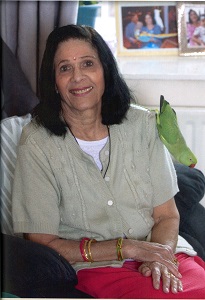
"Within six weeks of qualifying, I ended up getting a job at Blackburn with Darwen Borough Council and stayed there for 23 years. I retired in 2011 on my 65th birthday. Life was very difficult before that both financially and emotionally. We had to learn to adapt to things very quickly".
Ashok and Jai were one of a very few Hindu families in Blackburn. They only knew two other Hindu families in the town. A few years later quite a few families from their community in Tanzania ended up shifting to Blackburn.
"It was good because our support network increased. I was able to support them with getting work and they supported me emotionally.
"My first weekly salary was around £6.95. I could manage everything with £4.95 and would save £2 which was a lot back then. Things were very cheap in those days.
"The community in Blackburn was very friendly and sociable. Everyone just wanted to help each other, we felt like we were all the same, going through same hardships and lifestyles to get somewhere. The community spirit was always strong, and people were together regardless of your religion".
"I sometimes wonder what will happen when the older generations are no longer around."
Although Ashok and Jai understand the need to move with time, they appreciate that life was more vibrant when they first moved to Blackburn.
"We would all participate in each other's festivals and happy moments. There was more cheer and celebrations were a huge thing. I felt that people made more of an effort. We didn't have a lot of money, but everything was grander. You would see when it was Eid or Diwali, families would get together and houses lively and full. The culture is still there but the interest seems to have dropped. Older people try to keep the culture alive, but the younger generations are busy with other things like work. I sometimes wonder what will happen when the older generations are no longer around. When people from different countries moved to Blackburn, they made sure they embedded their culture, and they made a big deal to do so".
Ashok and Jai initially found it difficult to integrate because they weren't used to the culture. Ashok remembers a time where he worked at the mills.
"There were a lot of Italian workers who would use hand gestures to communicate. I couldn't connect with them because I didn't understand their way of communicating. I couldn't join in with their jokes".
Jai was a breath of fresh air in the fashion world in a town like Blackburn. She brought colour into a community that was adjusting to life in the UK.
"The fashion was a lot nicer back then. People loved their culture. I would wear sarees. When I got married families were very traditional and loved the elaborate designs of cultural clothing. It has become more liberal and westernised now".
Ashok has been an avid part of the Blackburn Hindu Centre since it first came to exist in the early 1970s.
"When I first came to Blackburn there weren't many Hindu families. As the number of families grew, my father wanted to set something up for the Hindu community. The aim was to meet the needs of the Hindu community in the town. It proved as a major contributor to promote and share Hindu culture, tradition and social etiquette with Indigenous population. I took over as president after my father passed away in a devastating accident. The community wanted me to take his position so that's what I did".
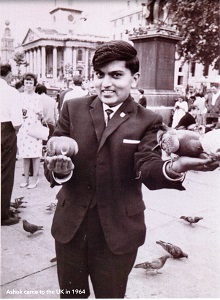
Ashok came to the UK in 1964But it wasn't just supporting people of his own faith. Ashok also wanted better community cohesion in the borough and did this through hid interfaith work.
"I have been involved in Blackburn Interfaith forum for 21 years now. I have always been an open-minded person and appreciated and respected people of all faiths and backgrounds. I was asked by someone to join and represent the Hindu community and I jumped at the idea. It's great connecting with people from all religions and walks of life. It's very close to my soul!"
"We came from humble backgrounds and were happy with everything that came our way, big or small".
The couple feel it's now easier to connect with all the advanced technology, but people have stopped meeting each other face to face according to Ashok.
"Everything seems to be done through the phone or laptop, People have become more independent and find their own way in life so that bond seems weaker now. COVID-19 had a huge impact on people and communities. People want to be left alone and have stopped connecting."
Ashok and Jai live in a lovely part of Blackburn now, but they firmly believe that their early experiences are what has shaped their lives now, and many others.
"I'd say things have changed for the better in a material sense but spiritually maybe not. There are better jobs, houses and more money but there's not much contentment. We came from humble backgrounds and were happy with anything that came our way, big or small. But I guess that you must move on with times as things are constantly changing."
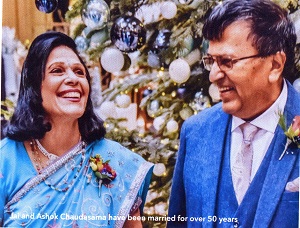
Jai and Ashok Chaudasama have been married for over 50 years
Article published in One Voice Blackburn, Issue 12 Spring 2025. Pages 21-24.
Transcribed by Shazia Kasim
With grateful thanks to the team at One Voice Blackburn for allowing Cotton Town to publish this article
Published May 2025
back to top
Out of Africa
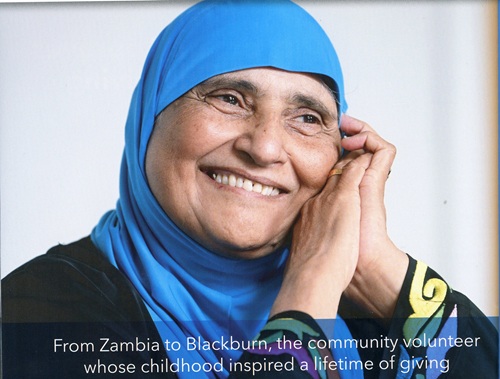
Blackburn is renowned for strong community spirit. Women have played a key role in leadership in the town, and that started back in the 1960s and 70s when the first ladies arrived from the sub-continent to join their husbands in the UK. Rabia Ismail arrived in the UK in the 1970s and has been a key figure in our community especially for other women. She speaks to One Voice Blackburn about the early days and how her community spirit is etched in her upbringing.

